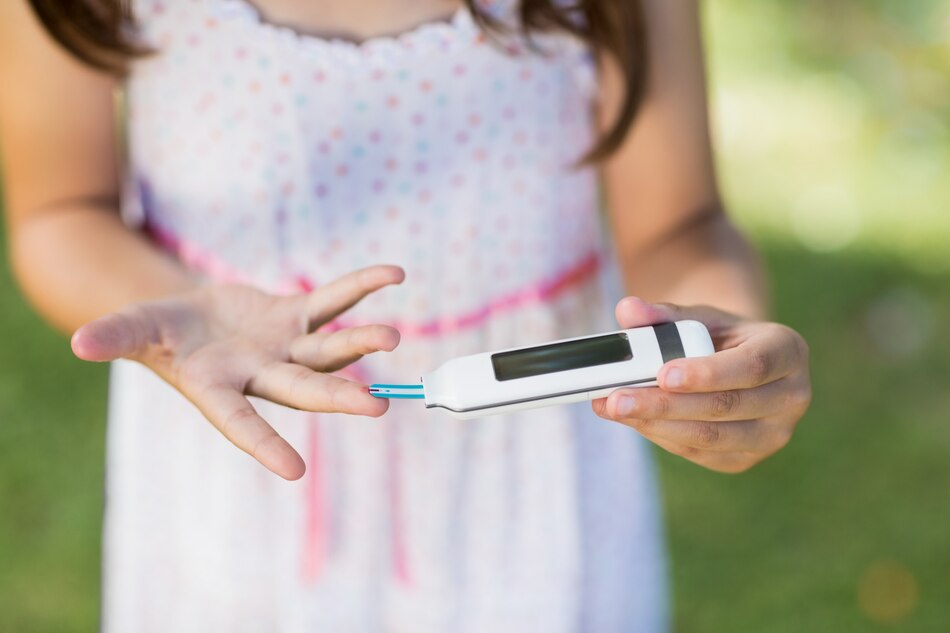A balanced diet and an active lifestyle are key for all kids to keep a healthy weight. For kids with diabetes, eating well, and staying active are especially important because weight can impact diabetes and diabetes can influence weight.
This applies to children and teens with both Type 1 and Type 2 diabetes.
Why does diabetes cause weight loss?
Diabetes usually has mild symptoms that get worse over time. One of these symptoms is unexplained weight loss. However, many people don’t realize they have diabetes and go undiagnosed.
What are the types of diabetes?
There are two main types of diabetes, each requiring a different treatment approach. Certain health conditions can also increase the risk of diabetes, such as when people take medications or have cystic fibrosis, a genetic disease that affects the body.
Type 1 diabetes:
Type 1 diabetes is an autoimmune condition, meaning the body’s immune system mistakenly attacks healthy tissues and destroys the cells in the pancreas that produce insulin. The pancreas consequently ceases producing insulin. Type 1 diabetes can occur at any age but usually starts in childhood or the teenage years.
Type 2 Diabetes:
Type 2 diabetes occurs when the pancreas doesn’t produce enough insulin, or the body can’t use it effectively. It typically develops in adults, but with increasing rates of childhood obesity, more children are also being diagnosed with type 2 diabetes. Being overweight is a major risk factor for this type, which is also the most common form of diabetes.
Reach out to the treatment of children diabetes in Coimbatore if your child is dealing with diabetes.
How much loss of weight is a concern?
When you lose a significant amount of weight without altering your diet, exercise routine, or other habits, it’s known as unexplained weight loss.
Doctors become concerned when someone loses 10 pounds or more, or 5% of their body weight, within six to 12 months. In adults 65 and older, they find that an underlying medical condition is responsible for the weight loss in 72% of cases.
The weight loss in children:
Unexplained weight loss can happen in people with type 2 diabetes, but it’s more common in those with type 1, which typically affects children and teens. Parents often notice unusual weight loss in a child with type 1 diabetes first.
Weight loss in children with diabetes can happen even if they have a normal or increased appetite, just like in adults with diabetes. Once children are diagnosed and treated, the weight loss stops, and their weight usually returns to normal.
What are the common symptoms of diabetes?
Diabetes symptoms are often subtle and develop slowly, making them hard to notice. Weight loss is one possible sign. Common signs of diabetes include excessive thirst, hunger, and urination, but these can also lead to dehydration. Long-term dehydration can cause:
- Dizziness
- Fatigue
- Fainting
- Rapid breathing
Dehydration can also lead to less frequent urination, which causes blood sugar to build up in the bloodstream. Blood sugar levels may rise too quickly as a result.
What is the importance of healthy weight?
When children with diabetes reach and maintain a healthy weight, they feel better and have more energy. Their diabetes symptoms improve, and their blood sugar levels are easier to manage. They may also have a lower risk of developing complications from diabetes, like heart disease.
To determine whether a child’s weight is healthy, doctors use the body mass index, or BMI. A weight management plan can be helpful if your doctor recommends losing weight to control your diabetes. Even if your child’s BMI is healthy, the doctor can assist in creating a healthy meal and exercise plan.
How can you help your child with diabetes?
Your emotional support plays a key role in helping your child reach a healthy weight. Overweight children may struggle with low self-esteem or feelings of guilt. Focus on staying positive and emphasize the importance of being “healthy” instead of using words like “fat” or “thin.” Help your child understand that everyone, including adults, needs to actively manage their weight.
Also, keep in mind that children often mirror their parents’ attitudes and behaviors about food and weight. Since you’re the one buying and preparing meals, offering healthy food choices and cooking nutritious meals gives your child the tools they need to achieve a healthy weight.
What are the other things you should know?
Over Snacking:
Some kids with diabetes may snack too much because they or their parents are concerned about low blood sugar. Keep an eye on the snacks in your home and how quickly they are consumed. If you’re unsure about healthy snack choices, speak with your doctor or a registered dietitian. It’s also important to discuss with your child the need to follow their diabetes diet.
Extreme dieting:
Some children with diabetes, particularly those in their teens, may attempt to reduce their weight using extreme methods or fad diets. While these diets aren’t healthy for anyone, they can be particularly harmful for people with diabetes because they can disrupt blood sugar levels.
Snacks sneaking:
Kids or teens may sometimes sneak extra candy or sweets that they’re supposed to eat in moderation, which can cause blood sugar levels to rise. Parents might then give the child more insulin to compensate. This cycle can lead to weight gain. Make sure your child understands why it’s important to stick to the meal plan, and don’t hesitate to ask questions if their blood sugar levels seem unusually high.
Important Takeaway:
By following the doctor’s recommendations for food and exercise, your child can achieve and maintain a healthy weight. Kids who reach a healthy weight feel better and find it easier to manage their diabetes. Additionally, they feel more in charge of their bodies, diabetes, and general well-being. Reach out to the Best Pediatric Endocrinologist In Coimbatore to undergo treatment for diabetes and ways to manage it.



